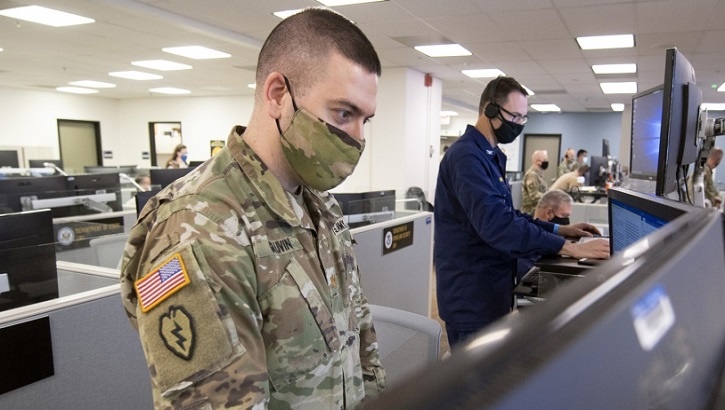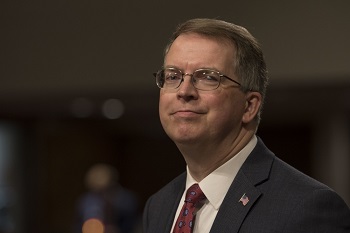Deputy defense secretary stresses team approach in battling COVID
 Army Maj. Nicholas Gauvin works inside Operation Warp Speed headquarters in Washington, D.C., last month. (Photo by EJ Hersom, DOD.)
Army Maj. Nicholas Gauvin works inside Operation Warp Speed headquarters in Washington, D.C., last month. (Photo by EJ Hersom, DOD.)
Deputy Secretary of Defense David Norquist emphasized a years-long reform of the Military Health System while praising the short-term effort of private industry, other government agencies, and the MHS working together toward a COVID-19 vaccine goal in his speech this week at the virtual 2020 annual meeting of AMSUS, the Society of Federal Health Professionals.
In his address, “The National Defense Strategy in 2020,” Norquist said while the general news of the COVID-19 vaccines in development and testing have been in the news for the past month or so, what we’re really seeing has been ongoing for 2020 — and even well before.
Norquist said that careful planning, correct execution, and making sure the vaccines are safe, effective, and follow the Centers for Disease Control and Prevention standards are crucial, whether in another pandemic or a different crisis.
Early on, leaders need to say, “what do we need to be as the end solution, not just the response to today, and how do I put in place a team to do that?” Norquist said.
Focusing solely on that long-term solution is what MHS has done with the Department of Health and Human Services and Operation Warp Speed, he emphasized.
 Deputy Secretary of Defense David Norquist praised the operation during his speech to the 2020 Annual Meeting of AMSUS. (Photo by EJ Hersom, DOD.)
Deputy Secretary of Defense David Norquist praised the operation during his speech to the 2020 Annual Meeting of AMSUS. (Photo by EJ Hersom, DOD.)
The Military Health System has played an important role implementing the National Defense Strategy, Norquist said. By undertaking critical reforms, the MHS is working on fulfilling the strategy’s first line of effort: to build a more lethal and ready force.
The MHS is one of the largest DOD programs, with a budget of more than $50 billion each year, and “warrants extra attention,” Norquist said.
In 2017, Congress directed the largest health care system reform in over a generation, recognizing the need to reform the military medical force and military medical treatment facilities.
“We need personnel with the right specialties to treat patients on and off the battlefield,” Norquist said. “Congress recognized that we were short on critical wartime specialties. Many of our military medical personnel provide services that are similar to the private sector. But we have fewer prepared to meet warfighter needs. As a result, Congress mandated DOD to rethink how we organize, train, and equip our medical force.
“Our goal is to achieve and sustain an appropriate specialty mix,” Norquist added. “While beneficiary care will always be important, Congress recognized the DOD needs to lead in the area it knows best. This change will save lives. The second major change concerns our [military medical treatment facilities]. This reform is related to the first, and it addresses efficiency in one of the largest cost drivers of the Military Health System. Congress directed us to transfer control of [military medical treatment facilities] from the services to the Defense Health Agency.”
Consolidating beneficiary care to the Defense Health Agency and focusing the service surgeons general on readiness removes risk, Norquist said, and leads to greater efficiencies and lower costs.
“Of course, I’d be remiss if I did not mention our progress on Operation Warp Speed, a joint effort with HHS to deliver safe and effective vaccines, therapeutics, and diagnostics in record time,” he added.
“Operation Warp Speed will enable immediate large-scale delivery of millions of doses, something only possible because production is already ongoing,” Norquist said, underscoring military readiness well before the vaccines were fully developed.